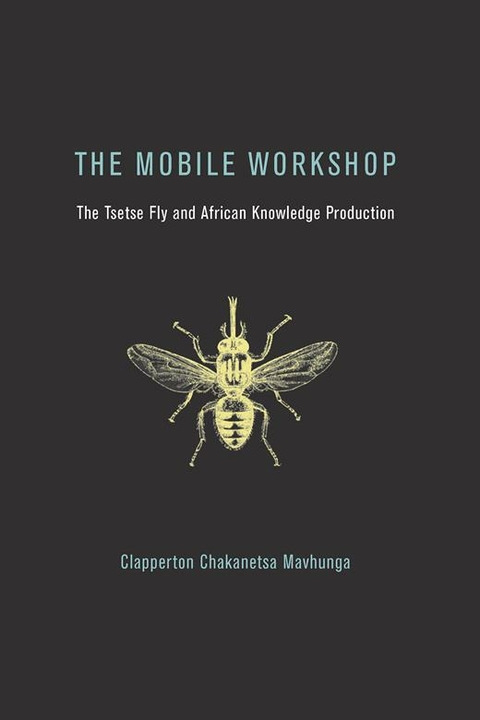
The Mobile Workshop
The Tsetse Fly and African Knowledge Production
2019
MIT Press (Hersteller)
978-0-262-34585-9 (ISBN)
MIT Press (Hersteller)
978-0-262-34585-9 (ISBN)
How the presence of the tsetse fly turned the African forest into an open laboratory where African knowledge formed the basis of colonial tsetse control policies.
The tsetse fly is a pan-African insect that bites an infective forest animal and ingests blood filled with invisible parasites, which it carries and transmits into cattle and people as it bites them, leading to n'gana (animal trypanosomiasis) and sleeping sickness. In The Mobile Workshop, Clapperton Chakanetsa Mavhunga examines how the presence of the tsetse fly turned the forests of Zimbabwe and southern Africa into an open laboratory where African knowledge formed the basis of colonial tsetse control policies. He traces the pestiferous work that an indefatigable, mobile insect does through its movements, and the work done by humans to control it.
Mavhunga's account restores the central role not just of African labor but of African intellect in the production of knowledge about the tsetse fly. He describes how European colonizers built on and beyond this knowledge toward destructive and toxic methods, including cutting down entire forests, forced “prophylactic” resettlement, massive destruction of wild animals, and extensive spraying of organochlorine pesticides. Throughout, Mavhunga uses African terms to describe the African experience, taking vernacular concepts as starting points in writing a narrative of ruzivo (knowledge) rather than viewing Africa through foreign keywords. The tsetse fly became a site of knowledge production—a mobile workshop of pestilence.
The tsetse fly is a pan-African insect that bites an infective forest animal and ingests blood filled with invisible parasites, which it carries and transmits into cattle and people as it bites them, leading to n'gana (animal trypanosomiasis) and sleeping sickness. In The Mobile Workshop, Clapperton Chakanetsa Mavhunga examines how the presence of the tsetse fly turned the forests of Zimbabwe and southern Africa into an open laboratory where African knowledge formed the basis of colonial tsetse control policies. He traces the pestiferous work that an indefatigable, mobile insect does through its movements, and the work done by humans to control it.
Mavhunga's account restores the central role not just of African labor but of African intellect in the production of knowledge about the tsetse fly. He describes how European colonizers built on and beyond this knowledge toward destructive and toxic methods, including cutting down entire forests, forced “prophylactic” resettlement, massive destruction of wild animals, and extensive spraying of organochlorine pesticides. Throughout, Mavhunga uses African terms to describe the African experience, taking vernacular concepts as starting points in writing a narrative of ruzivo (knowledge) rather than viewing Africa through foreign keywords. The tsetse fly became a site of knowledge production—a mobile workshop of pestilence.
Acknowledgments
Introducing Mhesvi and Ruzivo Rwemhesvi
1: How Vanhu Managed Tsetse
2: Translation into Science and Policy
3: Knowing a Fly
4: How to Trap a Fly
5: Attacking the Fly from Within: Parasitization and Sterilization
6: Exposing the Fly to Its Enemies
7: Cordon Sanitaire: Prophylactic Settlement
8: Traffic Control: A Surveillance System for Unwanted Passengers
9: Starving the Fly
10: The Coming of the Organochlorine Pesticide
11: Bombing Flies
12: The Work of Ground Spraying: Incoming Machines in Vatema’s Hands
13: DDT, Pollution, and Gomarara: A Muted Debate
14: Chemoprophylactics
15: Unleashed: Mhesvi in a Time of War
Conclusion: Vatema as Intellectual Agents
Glossary
Notes
References
Index
| Erscheint lt. Verlag | 19.9.2019 |
|---|---|
| Reihe/Serie | Mit Press |
| Sprache | englisch |
| Themenwelt | Geisteswissenschaften ► Geschichte ► Regional- / Ländergeschichte |
| Geschichte ► Teilgebiete der Geschichte ► Technikgeschichte | |
| Naturwissenschaften | |
| ISBN-10 | 0-262-34585-4 / 0262345854 |
| ISBN-13 | 978-0-262-34585-9 / 9780262345859 |
| Zustand | Neuware |
| Informationen gemäß Produktsicherheitsverordnung (GPSR) | |
| Haben Sie eine Frage zum Produkt? |